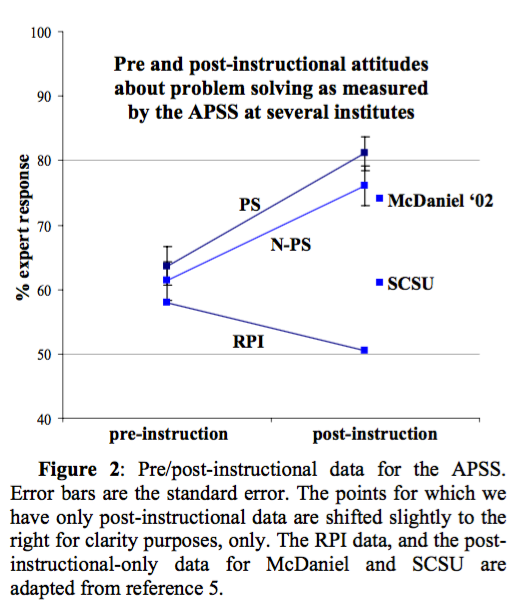Developed by Karen Cummings, Stephanie Lockwood, and Jeff Marx
| Purpose | To survey students’ attitudes towards and views of problem solving. |
|---|---|
| Format | Pre/post, Multiple-choice, Agree/disagree |
| Duration | 20 min |
| Focus | Beliefs / Attitudes (problem-solving) |
| Level | Intro college |
Sample questions from the APSS:
To what extent do you agree with each of the following statements?
A) Strongly Agree B) Agree Somewhat C) Neutral or Don’t Know D) Disagree Somewhat E) Strongly Disagree
If I’m not sure about the right way to start a problem, I’m stuck. There is nothing I can do with that problem except to go see the teacher or a friend for help.
It is never alright to make approximations when solving textbook problems in introductory physics.
more details
This is the third highest level of research validation, corresponding to at least 3 of the validation categories below.
Research Validation Summary
Based on Research Into:
- Student thinking
Studied Using:
- Student interviews
- Expert review
- Appropriate statistical analysis
Research Conducted:
- At multiple institutions
- By multiple research groups
- Peer-reviewed publication
Some of the Likert-scale agree/disagree questions on the APSS were adopted from the MPEX, while others were newly created. The questions underwent expert review and were revised. The APSS was given to over 250 introductory physics students at a private research institution, over 20 introductory physics students at a small liberal arts college and over 20 students at a medium sized state university. There were moderate correlations between APSS scores and other measures such as exam average and FMCE average. It was also found that those in the top third of the FMCE score distribution were more “expert-like” on every APSS question than those in the bottom third of the FMCE score distribution. The APSS has been given to over 300 students at three universities, and the results published in two peer-reviewed publications.
References
- K. Cummings, S. Lockwood, and J. Marx, Attitudes Toward Problem Solving as Predictors of Student Success, presented at the Physics Education Research Conference 2003, Madison, WI, 2003.
- J. Marx and K. Cummings, What Factors Really Influence Shifts in Students' Attitudes and Expectations in an Introductory Physics Course?, presented at the Physics Education Research Conference 2006, Syracuse, New York, 2006.
We don't have any translations of this assessment yet.
If you know of a translation that we don't have yet, or if you would like to translate this assessment, please contact us!
Download the APSS answer key.
| Typical Results |
|---|
Typical scores on the AAPS from (Marx and Cummings, 2006). Figure 2 displays the matched pre/post- instructional scores on the APSS for two sections of McDaniel students during Phase II of our study (labeled PS and N-PS). Also included are the pre/post-instructional averages from RPI, and the post-instructional averages for McDaniel College and Southern Connecticut State University (SCSU) for the Fall semester of 2002.
|
The latest version of the APSS, released in 2003, is version 1.





